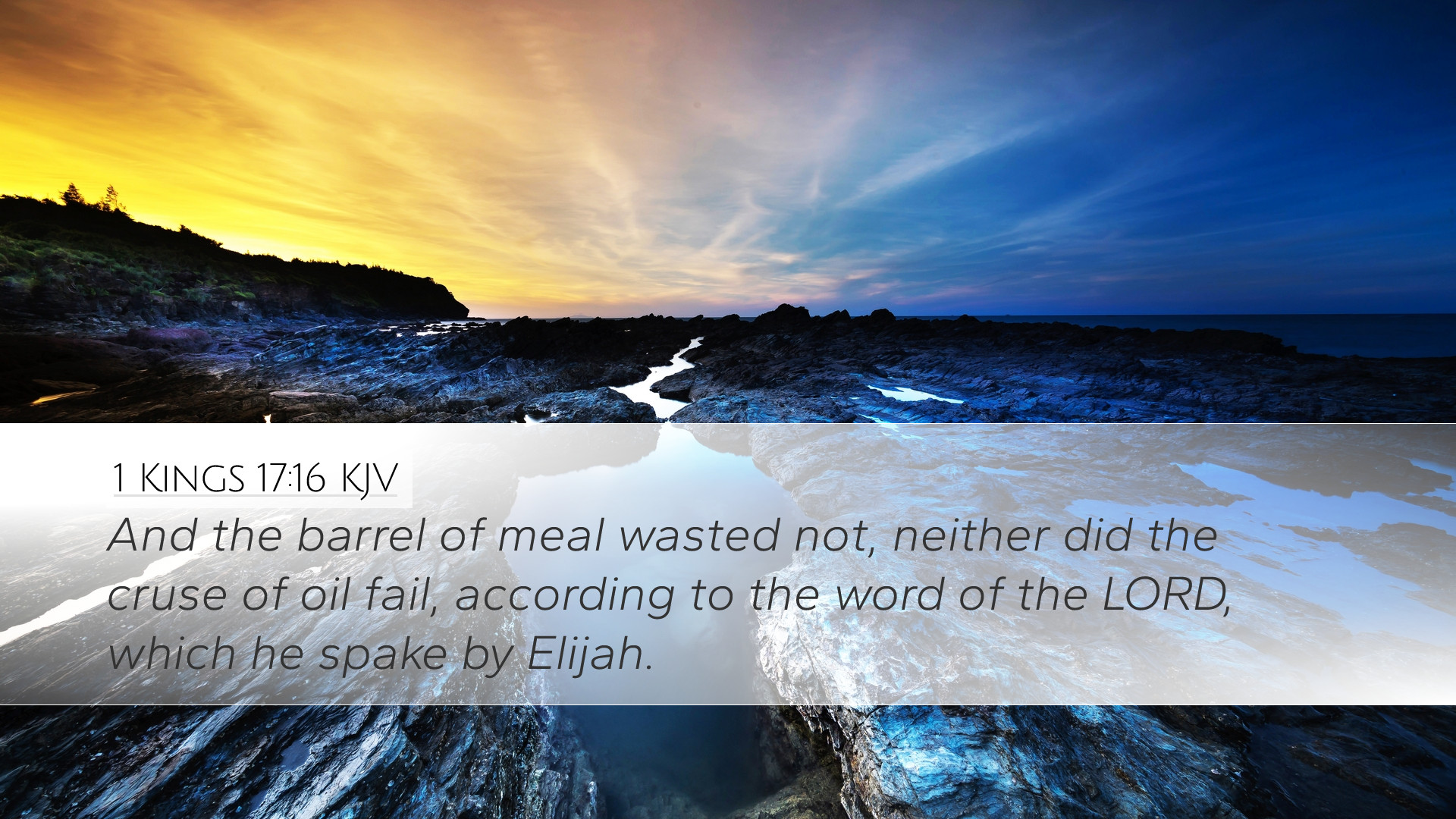Commentary on 1 Kings 17:16
Text of the Verse: "The jar of flour was not used up, and the jug of oil did not run dry, in keeping with the word of the Lord spoken by Elijah."
Introduction
1 Kings 17:16 encapsulates a profound moment in the ministry of the prophet Elijah, highlighting God's miraculous provision during a time of great scarcity. The interaction between Elijah, the widow of Zarephath, and the persistent supply of flour and oil illustrates key theological themes such as faith, divine sustenance, and God’s faithfulness to His word.
Contextual Background
The backdrop of this verse is a severe drought affecting Israel, where Elijah has been commanded by God to confront King Ahab regarding Israel’s idolatry and to call the people back to fidelity to Yahweh. During this time, God directs Elijah to a desolate region where he meets a widow whose dire circumstances echo the national crisis. This context serves to prepare the reader for understanding the depth of the miracle and its implications.
The Miracle of Provision
Faith in Action: The widow demonstrates a remarkable act of faith by responding to Elijah's request despite her own lack. Matthew Henry emphasizes that her willingness to share her last meal with the prophet not only reflects her compassion but also her burgeoning faith in Yahweh through Elijah’s assurance (Henry, 1 Kings 17:16).
Divine Assurance: Albert Barnes points out that Elijah’s promise is rooted in “the word of the Lord”, underscoring the reliability of divine declarations. The continuous supply of flour and oil becomes a tangible expression of God’s unfailing provision during desperate times (Barnes, 1 Kings 17:16).
Theological Implications
God's Faithfulness: Adam Clarke posits that this miraculous provision not only serves the immediate needs of the widow and her son but also illustrates God’s overarching faithfulness to His covenant people. The fact that the jar of flour and the jug of oil did not run dry invites reflection on God's ability to sustain His servants (Clarke, 1 Kings 17:16).
Symbol of Spiritual Nourishment: Furthermore, the flour and oil can be seen as symbolic of spiritual nourishment, reminding believers of their dependence on God. Just as physical needs are met, so too are spiritual needs provided for in abundance through faith in Christ (Clarke, 1 Kings 17:16).
Lessons for Believers
- The Call to Trust God: Believers are challenged to trust in God’s provision, even when circumstances appear dire. The widow's faith should inspire Christians to look beyond their immediate resources and trust in God's promises.
- The Importance of Generosity: The widow's willingness to share reflects the biblical principle of generosity. Often, it is in giving that we find our own needs met, demonstrating the paradox of kingdom economics.
- Living by God's Word: The verse encourages believers to rely on the Word of God for sustenance. Just as the widow trusted Elijah’s word, Christians today are called to rely on Scripture as the source of life and guidance.
Conclusion
1 Kings 17:16 is a powerful narrative that speaks to God’s provision and faithfulness amidst hardship. Through the lens of Elijah's encounter with the widow, the text challenges readers to recognize the dynamic interplay between faith and divine sustenance. As pastors, students, and scholars reflect on these insights, may they be reminded of God’s enduring promise to provide for His people and the transformative power of faith in action.


